Public testimony in the impeachment hearings has painted a vivid picture of a president fixated on one thing: his own political gain over the fortunes of an ally
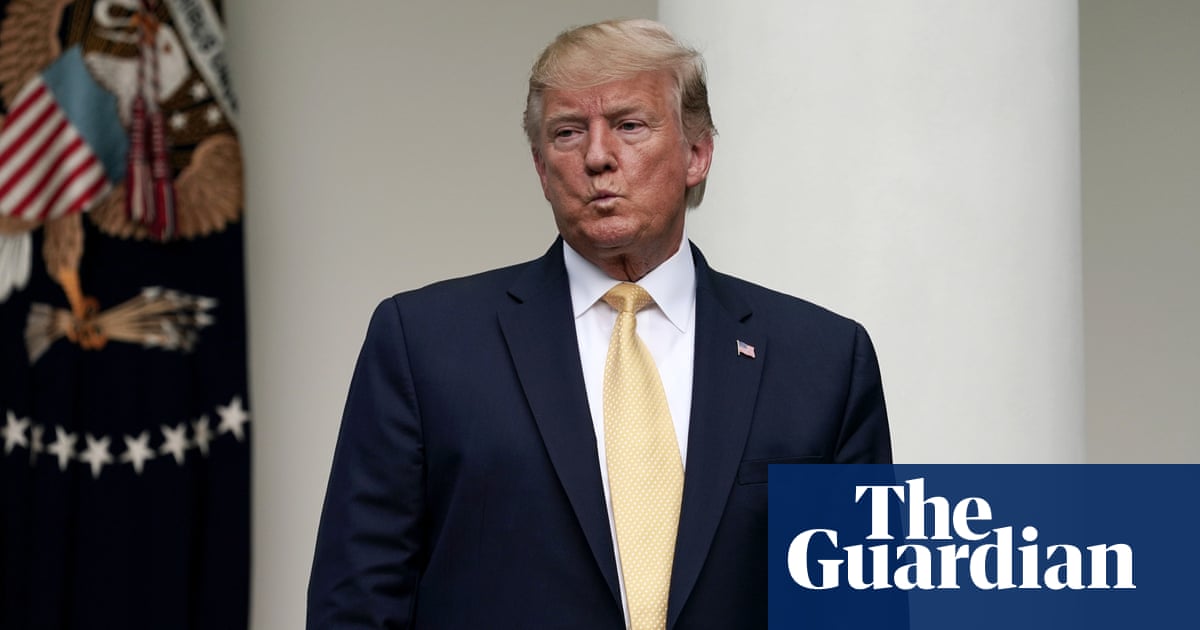
Darkness had settled over Kyiv on the evening of 24 April when Marie Yovanovitch, then US ambassador to Ukraine, wassummoned froman event she was hosting at her home to answer an urgent phone call from Washington.
The reception was to honor Kateryna Handzyuk, a young anti-corruption activist who died last year from an acid attack. Though the ambassador and the activist had never met, they shared a mission: trying to end a culture of corruption that has persisted for decades in the former Soviet republic.
Kateryna paid the ultimate price for her fearlessness in fighting against corruption and for her determined efforts to build a democratic Ukraine, Yovanovitch said that evening, before presenting the Women of Courage award to Handzyuks father, Victor.
Yovanovitch who had spent 33 years in the US foreign service, serving six presidents, and who was viewed by colleagues and superiors as an exemplary public servant left her guests to answer the call at around 10pm. It was Carol Perez, the director general of the state department.
Theres trouble coming, she warned Yovanovitch, according to testimony. The concerns, she added, came from up the street, an unambiguous reference to the White House.
Perez promised to find out more and call back at midnight. The minutes ticked by as Yovanovitch waited, racking her brain for answers.
It was a delicate moment for Ukraines young democracy, at war with Russia and in the midst of political transition. She had recently been asked to extend her service in Kyiv for another year, until 2020.
But she had for months been the target of a smear campaign led by a Ukrainian prosecutor and Donald Trumps personal lawyer, Rudy Giuliani. They wrongly accused her of disloyalty to the president and she believed that Giuliani saw her as a barrier to his interests in Ukraine. Was it possible their effort had succeeded in having her removed?
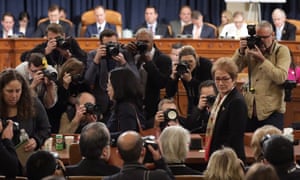
Finally, closer to 1am, the phone rang again.
Come home immediately, the ambassador was told. Get on the next plane to the US.
Quid pro quo
The abrupt removal of an American ambassador raised the curtain on an extraordinary abuse-of-power drama threatening to unravel the Trump presidency. In private depositions and five nationally televised public hearings as part of the House of Representatives impeachment investigation, Trump administration officials past and present described Yovanovitchs ousting and the events that followed as shocking, deeply troubling and a nightmare scenario.
In stark detail, they chronicled a concerted effort by the president and his allies to pressure on Ukraine to open investigations into Joe Biden, the former vice-president and a key political rival for Trump and a baseless and debunked conspiracy theory promoted by Russia that Ukraine had interfered in the 2016 US election. The demands amounted to, in the words of one witness, a domestic political errand that diverged from US policy goals and benefited Washingtons adversary, Moscow.
Multiple witnesses recounted a quid pro quo a this for that pressure campaign that involved Trump withholding $391m in military aid approved by Congress for Ukraine and refusing to meet with Volodymyr Zelenskiy, the countrys newly elected president, until he publicly pledged to investigate Trumps political rivals.
Q&A
What is ‘quid pro quo’?

The Latin phrase ‘quid pro quo’ meaning something for something simply denotes an exchange.
In the impeachment inquiry into Donald Trump, the alleged ‘quid pro quo’ was a deal proposed by the Trump administration in which the Ukrainians would announce an investigation of Joe Biden and 2016 election tampering. In return, US officials dangled a high-profile White House visit and almost $400m in military aid. Trumps critics say the deal amounts to an impeachable abuse of power.
Trump has argued that there was no ‘quid pro quo’ with Ukraine but even if there was, ‘there is nothing wrong with that, it is not an impeachable event’.
But Trump and Republicans argument that there was no such deal has been undermined by key evidence, including a summary of a phone call between Trump and the Ukrainian president; and witness testimony, including that of the EU ambassador, Gordon Sondland.
Sondland at first testified that he took Trump at this word that there was no quid pro quo, but he later changed his testimony and recalled advising a top Ukrainian official that ‘the resumption of US aid would likely not occur’ without the Ukrainian statement. Tom McCarthy
A whistleblower complaint alleging White House officials had witnessed Trump leverage the power of the presidency for political gain in a conversation with Zelenskiy triggered the opening of a formal impeachment inquiry in September, only the fourth time in American history.
New details are still emerging as congressional investigators prepare to deliver a report on their investigations findings. Next week the judiciary committee will hold its first public impeachment hearing on the question of whether Trumps dealings with Ukraine amount to high crimes and misdemeanors as provided for in the constitution.
This is a comprehensive account of the critical events that have brought Trump to the edge of impeachment. From the Oval Office to the frontlines of Ukraines war with Russia, it is based on dozens of hours of public testimony, thousands of pages of depositions conducted by congressional investigators, media interviews, online communications and other available records. In some instances, witnesses remember episodes differently and their recollections are reflected accordingly.
Trump has denied all accusations of wrongdoing and insisted there was no quid pro quo.
Americas mayor
For months beginning in late 2018, Giuliani worked contacts in Ukraine, trying to get what his client the president wanted.
Once regarded as Americas mayor and now better recognized as the presidents henchman, Giuliani has insisted that his work was to defend Trumps reputation and clear up rumors about 2016 election tampering. But witnesses said he had more insidious intentions: manufacturing smears against Biden.
With the help of his Soviet-born associates Lev Parnas and Igor Fruman, Giuliani made contact with the Ukrainian general prosecutor at the time, Yuriy Lutsenko, and his predecessor, Viktor Shokin. Both had complicated relationships with Yovanovitch, and Lutsenko in particular vowed revenge on the ambassador, according to testimony.
In March 2019, the smear campaign against Yovanovitch ricocheted from articles in the US news outlet the Hill to Donald Trump Jrs Twitter account. But Lutsenkos own history of corruption was about to catch up with him, and Giuliani needed more.
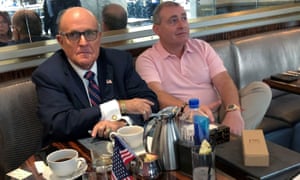
The former mayor of New York turned to two Ukrainian oligarchs, Dmytro Firtash and Ihor Kolomoisky, each of whom was in the crosshairs of the US justice department for alleged financial crimes. Through Parnas and Fruman, Giuliani offered to help the Ukrainians resolve their legal problems, the men said in exchange for favors, including access to Zelenskiy.
Giuliani has denied wrongdoing and told the New York Times that there is nothing improper about seeking information about the Bidens from the oligarchs. Where do you think you get information about crime? he said.
The Three Amigos
With Yovanovitch out of the way, Trump began to exploit a new pressure point.
Ukraine had just elected Zelenskiy, a comedian and actor with no political experience other than playing the role of president in a TV series. He was inaugurated on 20 May, the same day Yovanovitch officially left Ukraine.
Zelenskiy had campaigned as a reformer who would stand up to Russia and end endemic corruption. To solidify that reputation, few gestures would be as valuable as a meeting with the US president at the White House.
For weeks after his inauguration the Ukrainians sought a date for a visit. Then a delegation of Ukrainians was invited to meet with then national security adviser John Bolton at the White House on 10 July.
Neither the Ukrainian officials nor Bolton and his team were prepared for what followed.
Sitting in Boltons office, near the Oval Office, the two sides spoke for nearly 45 minutes before the Ukrainians inquired about a date for a presidential meeting.
Before Bolton replied, Gordon Sondland, a little-known hotelier who leveraged a million-dollar contribution to Trumps inauguration committee into an ambassadorship to the EU, pounced.
Sondland blurted out that an agreement had been reached. There will be a meeting, he said, according to testimony, if specific investigations are put under way.
Bolton stiffened.
For me, that was unmistakable body language, British-born Fiona Hill, then the top Russia adviser on the national security council (NSC), later testified, in her self-described distinctive working-class English accent. Then he looked up to the clock and at his watch and basically said: Well, its been really great to see you. Im afraid Ive got another meeting.
As the group spilled outside for a photo opportunity, which one attendee, the energy secretary, Rick Perry, commemorated on Twitter, Bolton took Hill aside and told her to follow them into a debrief meeting in the White House basement.
There, she found Sondland, with Perry and Kurt Volker, then an envoy to Ukraine. The trio was known as the Three Amigos and together they helped carry out Giulianis shadow foreign policy campaign in Ukraine.
I have a deal here with the [acting] chief of staff, [Mick] Mulvaney, Sondland said, pressing his case. There will be a meeting if the Ukrainians open up or announce these investigations into 2016 and into Burisma a reference to the Ukrainian natural gas company that once employed Bidens youngest son, Hunter, while he served as vice-president.
Hill and her deputy, Lt Col Alexander Vindman, confronted Sondland. I stated to Ambassador Sondland that this was inappropriate and it had nothing to do with national security, Vindman testified.
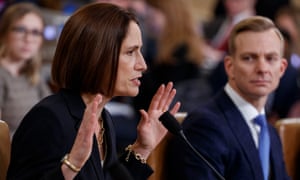
Hill went back to Bolton, who ordered her to report the meeting to John Eisenberg, the senior lawyer on the NSC. You tell Eisenberg, Ambassador Bolton told me, that I am not part of this, whatever drug deal that Mulvaney and Sondland are cooking up, she testified.
Asked by impeachment investigators whether she had relayed the message, Hill replied: I relayed it precisely.
There is no public record of Eisenberg ever acting on the complaint. Bolton has so far declined to step forward and say what he knows.
Sondland later said their recollections of protest jarred with his memory of the meeting, which he described as a positive step toward accomplishing our shared goals.
Everyone was smiling, he said. Everyone was happy, and we took a picture on the lawn on a nice, sunny day.
The ambassador testified that he worked at the express direction of the president on matters related to Ukraine. Talk to Rudy, he said Trump had instructed him.
Hill said she forewarned Sondland that this would not end well: I said to him: Ambassador Sondland, I think this is all going to blow up and here we are.
The phone call
They gathered around a speaker phone in the White House Situation Room: Alexander Vindman, NSC adviser Tim Morrison, and others. The secretary of state, Mike Pompeo, and Jennifer Williams, an aide to Mike Pence, were listening, too.
At 9.03 on 25 July, Trump picked up the phone and waited to be connected with Zelenskiy.
On the call, Trump congratulated Zelenskiy on his parliamentary victory. Zelenskiy told Trump he wanted to drain the swamp in Ukraine and called his American counterpart a great teacher.
I will say that we do a lot for Ukraine, Trump replied, according to a call summary published by the White House. I wouldnt say that its reciprocal necessarily because things are happening that are not good but the United States has been very, very good to Ukraine.
Zelenskiy replied that Trump is not only 100%, but actually 1,000% right. He said Ukraine was almost ready to buy more Javelin anti-tank missiles.
I would like you to do us a favor though because our country has been through a lot and Ukraine knows a lot about it, Trump replied. He went on to ask for two investigations: one into a 2016 election conspiracy theory about a Democratic server, and the second tied to Biden and his son.
Biden went around bragging that he stopped the prosecution so if you can look into it It sounds horrible to me, Trump said.
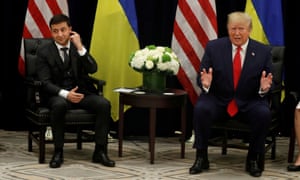
Zelenskiy told Trump that his new prosecutor will look into the situation, specifically to Burisma, the company that you mentioned in this issue. The White House summary would later omit the word Burisma, which Vindman insisted Zelenskiy said.
After the call ended, the White House advisers sat flabbergasted. Morrison had a sinking feeling and went to the lawyers. Vindman was shocked and went to the lawyers. Williams found the call inappropriate and political in nature and ensured the vice president had access to a transcript.
In the aftermath of the 25 July call, multiple people spoke with an unnamed whistleblower who began to assemble the complaint that would be submitted two weeks later to the inspector general of the intelligence community, and would eventually prompt the opening of the formal impeachment investigation into Trump.
Trump maintains that every aspect of the nothing call was perfect and beautiful.
The meeting
The next morning in Kyiv, Sondland, Volker and Bill Taylor, who replaced Yovanovitch as the top diplomat in Ukraine met with Zelenskiy.
Zelenskiy told the delegation that Trump had on three occasions during their call the day before raised some very sensitive issues that he hoped to broach with the president during an in-person meeting, according to David Holmes, a US embassy official in Kyiv, who took notes during the meeting. At the time, Holmes did not understand the reference because, contrary to standard procedure, the embassy had not received a readout of the call.
After the meeting, Taylor and Volker traveled to the front lines in northern Donbass.
I could see the armed and hostile Russian-led forces on the other side of the damaged bridge across the line of contact, Taylor later recalled. Over 13,000 Ukrainians had been killed in the war, one or two a week. To this day, that continues. More Ukrainians would undoubtedly die without US assistance.
At this point Taylor was aware the US was withholding congressionally-approved military assistance to Ukraine. But he still didnt know why.
The lunch
Sondland had stayed in Kyiv for a meeting with Andriy Yermak, a top aide to Zelenskiy. By the time Holmes was informed that he needed to take notes at the meeting, Sondland had already disappeared upstairs. He raced to catch him, arriving at Yermaks office too late.
Yermaks assistant refused to let Holmes into the room. She said the men had insisted on meeting one-on-one with no notetaker present. Without a choice, he took a seat in the anteroom and waited.
The meeting ended after half an hour, at noon. Shortly thereafter, Sondland, Holmes and two staff members were on their way to Sho, a trendy Ukrainian restaurant in the heart of Kyivs administrative district. They were led through a dining room with whitewashed walls and ornate chandeliers to a table on the outdoor terrace. Holmes sat opposite Sondland, close enough to share an appetizer.
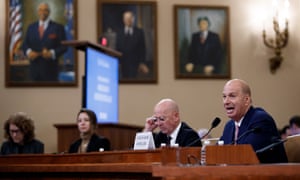
Sondland ordered a bottle of wine for the table. The conversation was breezy and social.
Then the ambassador announced he was going to call the president to give him an update on the mornings meetings. Holmes watched in amazement as Sondland dialed the White House and asked to be patched through to Trump.
Embassy officials assume that mobile communications in Ukraine are being monitored, he testified, especially as the countrys major mobile networks are owned by Russian companies.
It was lunchtime. All around, waiters in clean white shirts whizzed past with steaming plates of rabbit-filled varenyk and pots of crimson borscht.
Gordon Sondland, he said into the receiver, according to Holmess testimony. Holding for the president.
An unmistakable voice boomed from across the Atlantic. Sondland theatrically jerked the phone away from his ear, presumably because of the loud volume.
He told the president he was calling from Kyiv. Trump asked if Sondland was in Ukraine. He was, Sondland replied, and fresh from a meeting with the countrys new president who, he told Trump, loves your ass.
So hes going to do the investigation? Trump asked.
Hes going to do it, Sondland said. Zelenskiy would do anything you ask him.
From across the table, Holmes said he could hear both sides of the call, which lasted nearly two-minutes and quickly moved on to other topics, including A$AP Rocky and the Kardashians.
When the call was done, Holmes, emboldened by the ambassadors candor, asked whether it was true that the president did not give a shit about Ukraine. Sondland said it was and explained that he only cared about big stuff. A war with Russia should count as big stuff, Holmes countered. Sondland shook his head. Trump was only interested in things like the Biden investigation that Giuliani was pushing.
Every element was extraordinary, Holmes told investigators.
Sondland later said he did not remember the phone call but did not dispute the conversation: That sounds like something I would say.
Pences Poland visit
As a hellscape brewed in the western Atlantic, the White House reconsidered plans to send Trump to Warsaw for an event commemorating the 80th anniversary of the Nazi invasion of Poland.
Hurricane Dorian had ravaged the Bahamas, leaving hundreds missing and whole neighborhoods washed away, and the category 4 storm was threatening Florida.
On the sidelines of the Warsaw event, Trump was to meet with Zelenskiy, but it was decided that Pence would travel to the event in his stead.
The Ukrainians were dealing with a looming disaster of their own. Days earlier, the suspension of almost $400m in US military assistance for Ukraine had been made public.
Taylor had become increasingly alarmed by the behind-the-scenes machinations to force Zelenskiy into a public box by formally announcing that Ukraine was opening investigations into Burisma, the Bidens and 2016 election meddling.
The Ukrainians were hesitant. They wanted to lock down a date for a meeting at the White House before making a public declaration.
On 29 August, at the urging of Bolton, Taylor sent a rare cable directly to the secretary of state. Writing in the first person, he told Pompeo that withholding military aid was folly. He testified that it was the first time he had ever sent such a cable in his decades-long career. Pompeo did not reply.
Ahead of the Warsaw meeting on 1 September, the American delegation discussed how to handle questions about the frozen military assistance. Sondland jumped in and offered what he knew. It looks like everything is being held up until these statements get made, he said.
At the meeting, Zelenskiy immediately brought up the military aid. Pence assured the anxious president that military aid to Ukraine was a priority and that he would raise the issue with Trump when he returned.
After the inconclusive meeting, Sondland pulled Yermak into an anteroom. Whats going on here? Yermak asked. Thats when Sondland, according to testimony, told Yermak that the aid would be released if Ukraine announced a new investigation into Burisma. (Sondland later testified that he presumed the two matters were connected in the absence of any credible explanation, but said Trump never explicitly conveyed that to him.)
Then the ambassador spoke with Morrison, who was part of the delegation. He walked across the space and he briefed me on what he had said to Mr Yermak, testified Morrison, who promptly reported the conversation to Taylor.
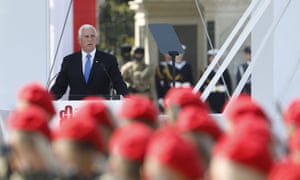
Photograph: Wojtek Radwaski/AFP/Getty Images
I was alarmed by what Mr Morrison told me about the SondlandYermak conversation, Taylor said. This was the first time I had heard that security assistance, not just the White House meeting, was conditioned on the investigations.
Taylor immediately texted Sondland. Are we now saying that security assistance and WH meeting are conditioned on investigations? he asked.
Call me, Sondland replied.
Taylor called him. He said Sondland told him that everything was dependent on such an announcement, including security assistance.
But the view from Washington was shifting. At this point, according to news reports, Trump was already aware of the existence of the whistleblower complaint while members of Congress pressured the White House to release the aid.
On 9 September, Taylor texted Sondland again: As I said on the phone, I think its crazy to withhold security assistance for help with a political campaign.
Sondland, spurred by Taylors increasingly frantic texts, said he called Trump directly to ask for clarity.
What do you want from Ukraine? Sondland testified that he asked an irritable Trump.
I want nothing, he said Trump replied. I want no quid pro quo. Tell Zelenskiy to do the right thing.
It was also on 9 September that Congress learned of the existence of the whistleblower complaint. Two days later, the military aid is released.
Two weeks after that, House speaker Nancy Pelosi, the top Democrat in Congress, announced the commencement of a formal impeachment inquiry, which proceeds next week.
The actions of the Trump presidency revealed dishonorable facts of the presidents betrayal of his oath of office, betrayal of national security and betrayal of the integrity of our elections, she said, concluding: The president must be held accountable. No one is above the law.
Read more: https://www.theguardian.com/us-news/2019/nov/30/trump-ukraine-alleged-bribery-impeachment-inquiry


Recent Comments